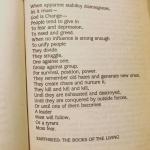One major focus of the questions students at McCormick Seminary asked in response to my book Theology and Science Fiction was about canon (and that was just based on what I wrote in the book, without them knowing that I had invented a card game to foster discussion of the subject in class!)
One reason I think the subject of canon is particularly important is how it clarifies a key point about authority. George Lucas may or may not be the Star Wars equivalent of the Pope. But if most fans do not accept his authority to decide what is and isn’t canon, in the movies he made and then his revisions to them, then it reveals that authority actually lies with us, with individuals and communities. An authority figure may have the power to kill you if you don’t articulate adherence to their teachings, but they simply do not have the authority to define canon for everyone unless everyone acknowledges, embraces, and submits to that authority. The authority thus lies with us, even when we give it away.
The conversation also gave us a chance to talk about authoritative pronouncements and social media. J. K. Rowling has been actively trying to maintain control of how the Harry Potter franchise is interpreted, including on Twitter. The mention of whether tweets are authoritative led to some knowing glances, but that wasn’t where I wanted to go with the conversation. Rather I was thinking about the fact that (despite widespread misperception about this) if you follow Pope Francis on Twitter, you are not getting official statements that the Roman Catholic Church considers infallible. One student interprets Harry Potter as the imaginary world into which an abused child takes refuge from reality, much to the annoyance of fans in the seminar room. I asked whether it mightn’t be worth exploring comparably different approaches to interpreting the Book of Revelation – as a genuine mystical experience, as simply someone writing in that genre, and as the dream world of a persecuted and exiled individual trying to cope with the trauma of that experience.
Daniel Kirk recently shared some thoughts on Facebook about Protestantism’s emphasis on the authority of the individual to interpret scripture. I responded to that by highlighting the disconnect between that Protestant emphasis and where fundamentalism detoured it to. Fundamentalist Protestantism became ludicrous and self-contradictory when it insisted that the key to salvation is for the individual to make sure that they use their “authority to read and interpret the Bible” to draw only the “one correct interpretation” that fundamentalists authorize them to. Fundamentalist dogmatism is thus fundamentally (pun intended) at odds with the general Protestant emphasis (as well as the even more prominent Baptist emphasis) on freedom of conscience and of interpretation on the part of the individual.
I love the ways that bringing science fiction and speculative fiction fandoms into the conversation can help to highlight important matters related to the Bible and its interpretation!
Of related interest, there is a job opening for an assistant professor of science fiction and/or fantasy literature…













